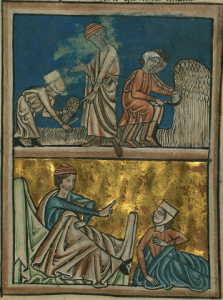Redemption. From What?
What does redemption mean? What are we redeemed from?
The biblical term denotes “release from bondage.” Because of our own weaknesses (social, physical, or spiritual), a stronger patron-like Savior must enact our release.

HOW do redeemers redeem?
In the Bible, people are redeemed in three main ways:
- Money – A person of material resources could ‘redeem’ someone/thing by simply paying money to acquire ownership rights. Leviticus 25 explains the prices by which Israelites could redeem family real estate or enslaved family members. Boaz paid money to redeem Naomi’s land and restore it to her descendants.
- Force – Through sheer power, a person could ‘redeem’ another from an undesirable state. This is how Yahweh redeemed Israel from slavery/bondage in Egypt. God did not pay Pharaoh for Israel; he claimed them from slavery with his mighty hand (Ex 6:6, Duet 7:8).
- Relationship – When a powerful person voluntarily associates with someone lowly, that person is released from social shame and vulnerability. Marriage and adoption are the most common forms of this. The Levirate marriage, where a kinsman-redeemer marries his brother’s widow, is a common framework of biblical redemption (cf. Gen 38 and Ruth).
FROM WHAT do redeemers redeem?
The common refrain in contemporary theology is that we are redeemed from the guilt and punishment of our sin. Renown theologian and church historian Philip Schaff says redemption in modern theology mostly designates “the removal of guilt.” (His article mentions guilt 14x, but not once shame nor bondage.)
But in the Bible, redemption is “release from (shameful) bondage.” The motif of redemption is prominent in three areas of scripture—Ruth, Isaiah, Numbers 35. Each illustrates how redemption involves release from shame.
3 Biblical Examples of Redemption
- Ruth.
 Redemption is a prominent theme in the book of Ruth, appearing in some form 22 times. Having lost their husbands and left their land, Ruth and Naomi become marginalized widows. With no children or property, they experienced the shame of isolation. Their family name ceasing to exist would have created intense feelings of disgrace, hence Naomi’s bitterness. But God redeems these homeless widows. Boaz, as a kinsman-redeemer, takes responsibility for producing a son and purchasing the land for Naomi. When Naomi receives a son, all the village women gather around to name the child (a public acknowledgement of Naomi’s new honorable status). At the narrative’s closing, we learn that child is actually David’s grandfather—a fact that bestows great honor upon Naomi and Ruth as progenitors of royalty. Through Boaz, God redeemed Ruth and Naomi from the shame of widowhood and made them royal matriarchs!
Redemption is a prominent theme in the book of Ruth, appearing in some form 22 times. Having lost their husbands and left their land, Ruth and Naomi become marginalized widows. With no children or property, they experienced the shame of isolation. Their family name ceasing to exist would have created intense feelings of disgrace, hence Naomi’s bitterness. But God redeems these homeless widows. Boaz, as a kinsman-redeemer, takes responsibility for producing a son and purchasing the land for Naomi. When Naomi receives a son, all the village women gather around to name the child (a public acknowledgement of Naomi’s new honorable status). At the narrative’s closing, we learn that child is actually David’s grandfather—a fact that bestows great honor upon Naomi and Ruth as progenitors of royalty. Through Boaz, God redeemed Ruth and Naomi from the shame of widowhood and made them royal matriarchs! - Isaiah. Isaiah also employs redemption language to portray Israel’s release from Babylonian exile as a second Exodus. Yahweh is Israel’s Redeemer from the shame of exile. The Redeemer promises to the despised and rejected that kings and princes shall respect and revere them.
Thus says the LORD, the Redeemer of Israel and his Holy One, to one deeply despised, abhorred by the nations, the slave of rulers, “Kings shall see and stand up, princes, and they shall prostrate themselves, because of the LORD, who is faithful, the Holy One of Israel, who has chosen you.” (Isa 49:7)
Because God was Israel’s redeemer, they would not face shame and disgrace.
Do not fear, for you will not be ashamed; do not be discouraged, for you will not suffer disgrace; for you will forget the shame of your youth, and the disgrace of your widowhood you will remember no more. For your Maker is your husband, the LORD of hosts is his name; the Holy One of Israel is your Redeemer, the God of the whole earth he is called. (Isa 54:4-5)
3. Numbers 35 and Refuge Cities. Yahweh’s instructions about cities of refuge for murderers in Numbers 35:9-29, provides another window into Hebraic redemption. The word ‘avenger’ (used 7x) is an alternative translation for the word ‘redeemer’ (Hebrew g’l). These instructions for how murderers should be handled are confusing and perhaps offensive for Western readers. They appear to prescribe acceptable terms for honor-killings. Numbers 35 explains how, if someone is killed, the victim’s family could properly avenge the blood of the murdered and restore the family honor through retaliation. Nevertheless, redemption here refers to the removal of disgrace, the defense of eroded honor, and the restoration of the family’s insulted reputation.
Summary
Shame comes from sovereign circumstances (e.g., Ruth), our sinful disloyalty (e.g. Isaiah), or the violence of others (e.g., Num 35). Regardless of the source of our shame, our only hope is for someone bigger and stronger to enact our redemption. The theme of redemption from shame continues in the New Testament. We are redeemed from slavery to adoption (Rom 8:23, Gal 4:5)—a complete reversal of status from shame to honor. Since we are overcome by sin and weaknesses, biblical salvation necessitates redemption from degrading bondages.
God alone redeems, champions, defends, and avenges our standing and worth (Ps 49:8). God is the ultimate Redeemer of His people from the dehumanizing and shameful bondage of sin.
______________
Read more in this series, “Honoring Theology“:

I am a little surprised that the first biblical example given is not the redemption from Egypt which is the fundamental meaning of redemption for the people of Israel (your banner spells this out, “God redeems us from shameful bondage”
This is the theme which is evoked many times by the Psalmist(s), YHWH’s amazing intervention to rescue his oppressed people and to make them truly become his own people, his treasured (honoured) possession.
Nowhere in the OT is redemption associated with removal of guilt. In the NT sometimes redemption seems to become conflated with atonement, but this has more to do with the confluence of multiple saving activities in the person of Jesus.
Great explanation of biblical redemption. Helped me have a clearer insight into why power encounters are often as important as truth encounters. We are looking for a redeemer – someone capable, powerful enough to redeem and restore life not only in terms of health and quality of life but also socially to lift shame, disgrace, and provide hope and honor.